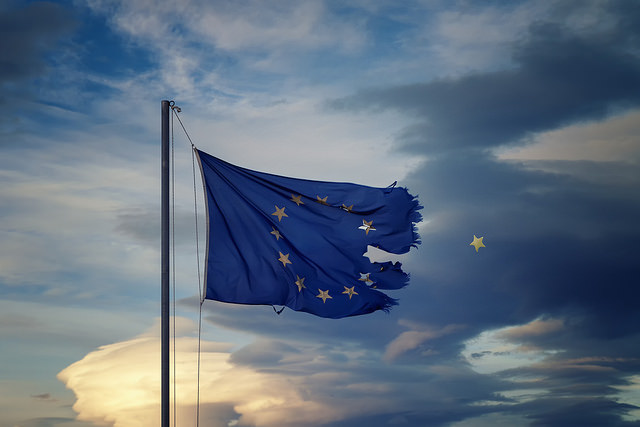
Since 1972, 58 referendums have been held on the EU, whether on joining it, extending it or governing it. As a report from Notre Europe points out, almost all had consequences (one of the exceptions was Spain’s 2005 referendum on the treaty establishing a constitution for Europe, a project torpedoed by the French and Dutch). In the case of Brexit it goes without saying that there will also be consequences, and much more profound. We have entered uncharted waters, one might almost say a new era (Angela Merkel has talked about a ‘turning point’, but not where the turning is taking us) for an EU designed for adding and integrating, not for subtracting or divorces. The British people’s decision also comes at an already difficult time for Europe in terms of the politics, economy and societies that constitute it.
Precedent
It is not the first time that a territory has left the EU. Greenland did so in 1985, but continued being part of Denmark, a member state. Algeria, as a French department, featured in treaties up until Maastricht (1992), but it is different this time. The UK’s case constitutes the first time that a member state is going to leave, rather than enter, something that weakens the EU’s credibility and could trigger a rash of similar referendums in other countries where Euroscepticism, or anti-Europeanism, is now the majority view. In the Netherlands, with the new law of 2015, it seems likely they will have to vote on the Brexit terms, when they are negotiated, which may turn into a referendum on Dutch membership of the EU. With the British vote the irreversibility of European integration has been shattered. We are in a reversible EU. This is the most important consequence, since it may affect the supposed irreversibility of the euro, at least for some countries, when the question of the Greece’s permanence, for example, is not absolutely guaranteed.
Europe on the wane
It remains to be seen whether the European Council meeting this Tuesday and Wednesday rallies round to strengthen Europe, and especially its nucleus, the Eurozone, to head off contamination from Brexit with a positive-sounding message. Any progress in the direction set out by the Five Presidents’ Report, if only for the Eurozone, would be an important step. The pressing and necessary thing is to preserve what exists, but it is by no means clear this is possible unless progress is made in certain areas.
The problem is that, with the odd exception, there is no appetite for ‘more Europe’, either in the electorates or in a growing number of European governments. The Eurosceptic movements have received a psychological and political boost. A foretaste of this came even before the Brexit vote with the creation of the EU’s new Border and Coast Guard, set to replace Frontex, which will be better funded than the latter, but which in the end will not be able to deploy in a member state without that state’s prior consent: a question of sovereignty. Moreover, negotiating the British departure is going to tie up the EU in a great deal of effort and summits for several years.
And from outside, albeit with fewer instruments than on the inside, London will do all it can to halt European advances. As far as security is concerned it will of course try to prioritise NATO over the EU. It may even be a mistake, or at any rate a missed opportunity, that it is at this European Council meeting that the High Representative for Foreign Affairs and Security Policy, Federica Mogherini, is scheduled to present her Global Strategy, since it will not receive the attention it deserves, all eyes being trained on the fallout from Brexit.
A more German Europe
The balance of power in the EU is going to change. The UK, even from outside the Eurozone, served as a counterweight to the power Germany exerts in the EU, not only in itself but also for other countries. We can expect to see German influence grow, unimpeded by France with its vast internal difficulties. Despite their sensible words, there is little Angela Merkel and François Hollande will really be able to do in the run-up to their respective national elections in 2017. Their views, moreover, are mutually incompatible. The French Finance Minister, Emmanuel Macron, admitted as much when he said they are confronting two taboos: the French concerning more transfers of sovereignty, and the German concerning more financial transfers and fiscal solidarity. Even in their initial reactions they have disagreed on the desirability of whether the UK should leave the EU calmly or in haste.
Europe locks itself in
According to the opinion polls, the decisive factor in the success of Brexit was immigration, which for many British people, fundamentally the English, imperilled their identity and way of life. The inability to halt it caused many citizens to mistrust David Cameron’s government. But the refugee crisis has highlighted the growing rejection of immigration, in particular that of Muslims, in large parts of the EU. Frontiers and walls are returning to a Europe where identities matter and will continue to matter. And the consequences for processes already underway, such as the TTIP (Transatlantic Trade and Investment Partnership between the EU and the US) remain to be seen. All this is part of Europe’s loss of influence, aggravated by Brexit.
For a bottom-up Europe
Despite the 58 referendums, none of them pan-European, the EU has been built from the top down. Furthermore, as Chris J. Bickerton –who declared himself to be pro-Brexit– argued in his indispensible 2013 book, many governments have used the EU as a means of approving unpopular measures from Brussels (where they themselves participate in a system of shared sovereignty), depriving the domestic democratic system of the debate. It is time to rebuild Europe from below, in a more democratic way (such as there is in the UK), in a republican –inspired by Bodin’s La République– and citizen-oriented direction, mobilising European civil society and equipping it with a voice in the European system, something I have previously advocated with Ulrike Guérot. It also means abandoning federal fantasies and the idea of a United States of Europe. The EU is different and should now focus on building shared European assets; and in launching from Europe (and from the member states) something decisive aimed at reversing the decline of the middle and lower classes, which lies at the root of all that it is befalling the West.


